Managing Your Emotions (Therapy from Quran and Sunnah-2) by Dr Feryad A Hussain
Managing Your Emotions (Therapy from Quran and Sunnah-2) by Dr Feryad A Hussain
Publisher:
IIPH (International Islamic Publishing House)
Author:
Dr Feryad A Hussain
Language:
English
Binding:
Hard Cover
Pages: 215
Size: 21.5x14.5x1cm
Couldn't load pickup availability
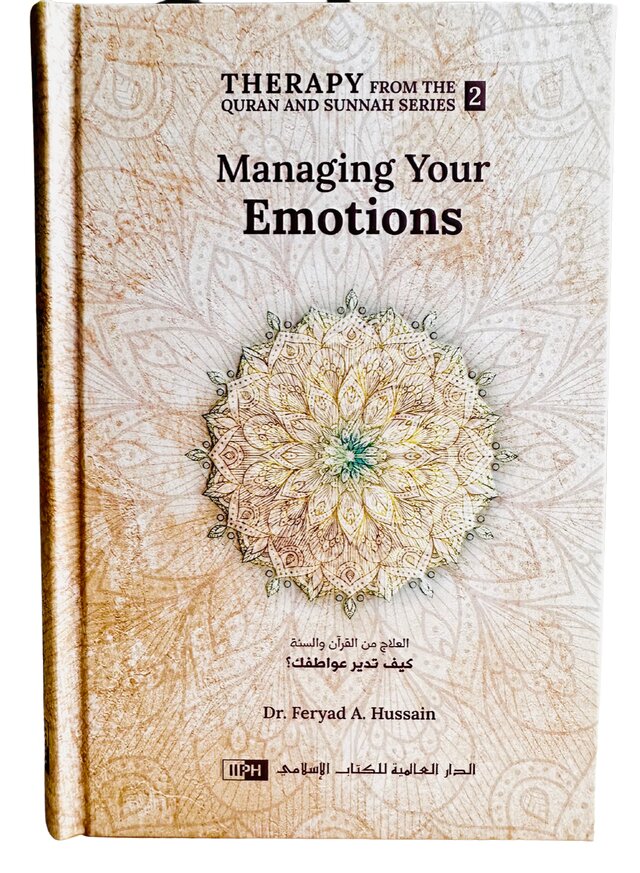
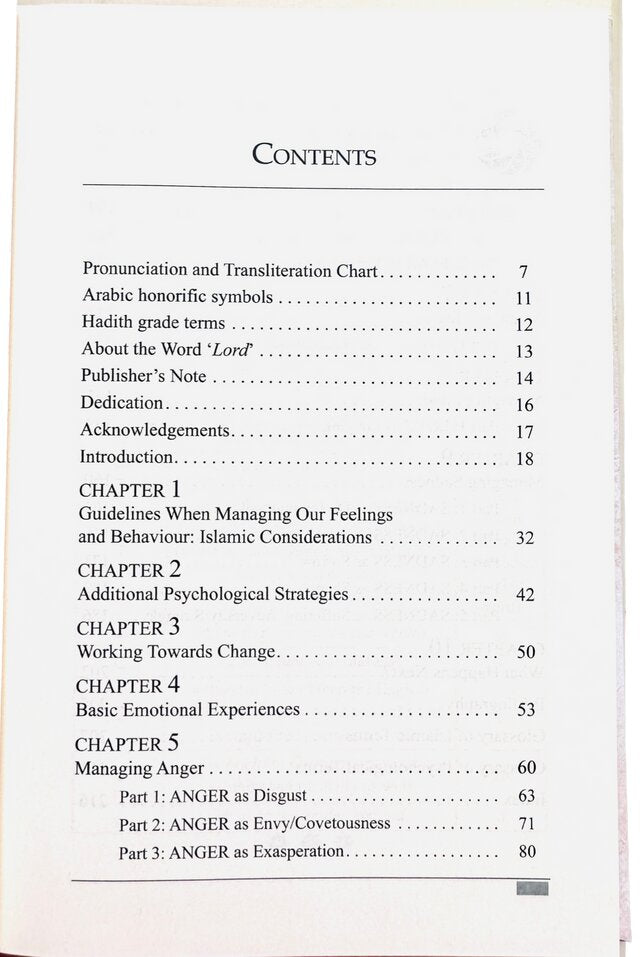
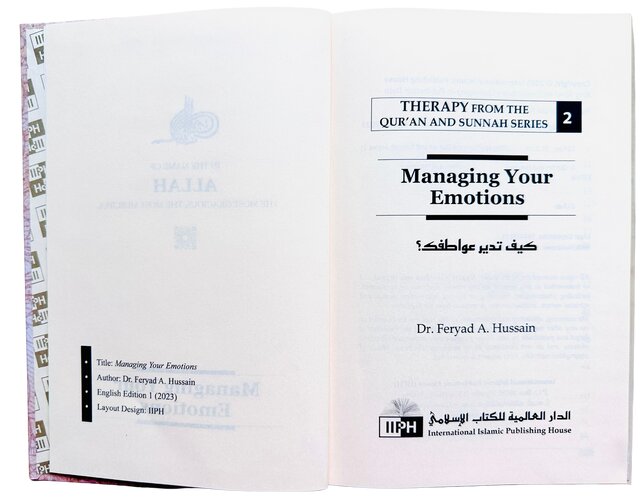
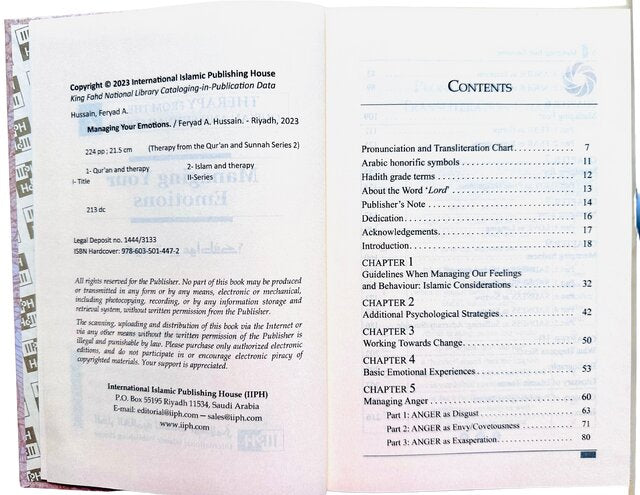
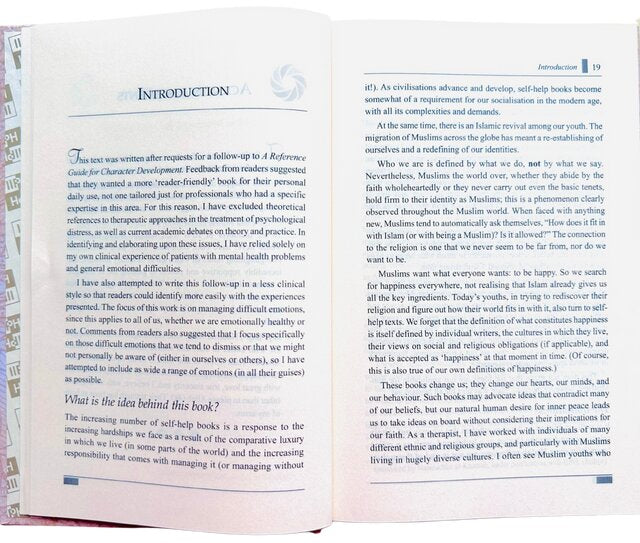
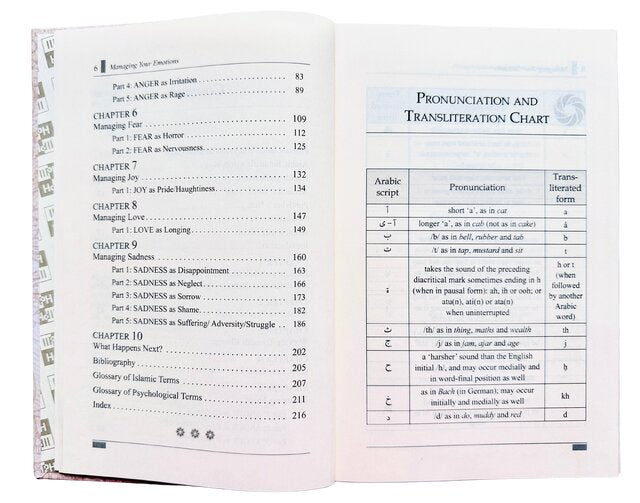
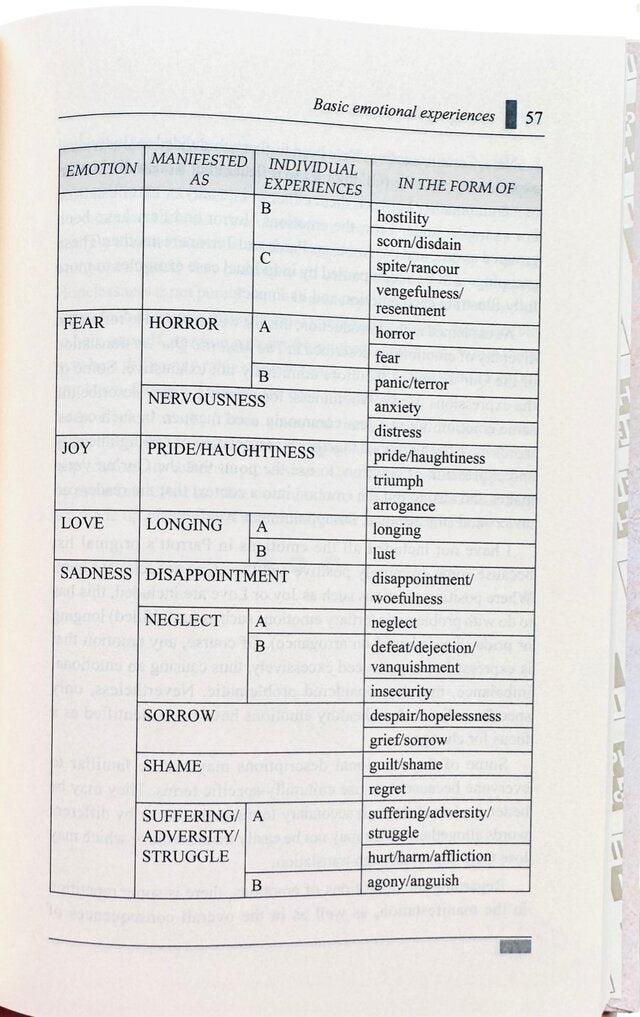
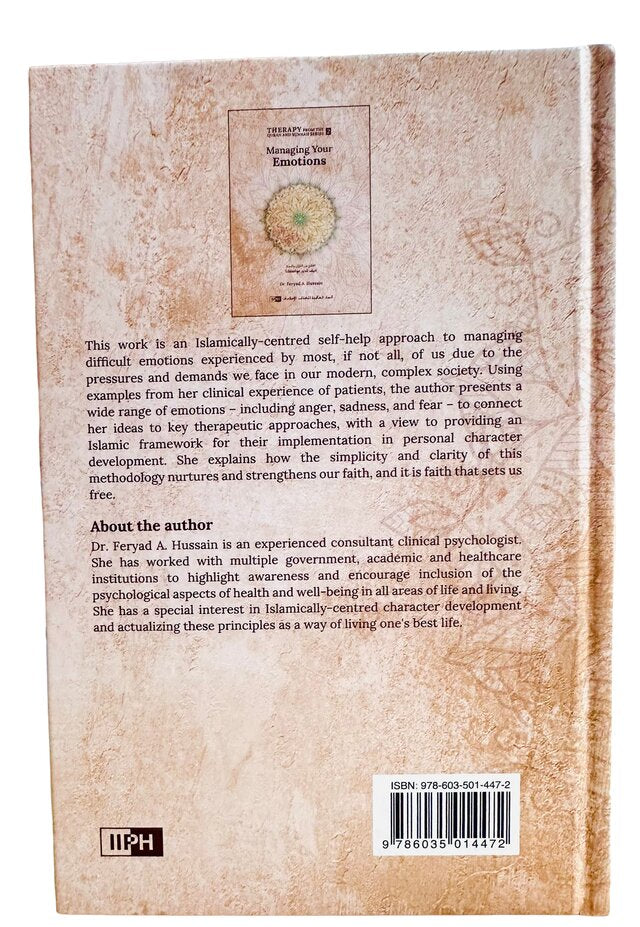
Collapsible content
Description of Book
Managing Your Emotions (Therapy from Quran and Sunnah-2) by Dr Feryad A Hussain
This book offers an Islamically-centered approach to managing challenging emotions that many of us experience in today's fast-paced, complex world. Drawing from her clinical experience, the author explores a wide range of emotions, such as anger, sadness, and fear, and connects these feelings to key therapeutic practices. She provides an Islamic framework for emotional management, emphasizing how these methods can be applied to personal character development. Through this approach, the author demonstrates how nurturing and strengthening our faith can help us overcome emotional struggles, ultimately leading to greater peace and personal freedom.
Publisher
IIPH (International Islamic Publishing House)
Author
- Dr Feryad A Hussain
Sample Pages - Content
Page:01
THERAPY FROM THE
QURAN AND SUNNAH SERIES
2
Managing Your Emotions
العلاج من القرآن والسنة كيف تدير عواطفك؟
Dr. Feryad A. Hussain
الدار العالمية للكتاب الإسلامي IIPH
Page:02
PH
PH
НАЈЛА
Title: Managing Your Emotions
Author: Dr. Feryad A. Hussain
2026M
English Edition 1 (2023)
Layout Design: IIPHomil
THERAPY FROM THE QUR'AN AND SUNNAH SERIES
Managing Your Emotions
IIPH
كيف تدير عواطفك ؟
Dr. Feryad A. Hussain
الدار العالمية للكتاب الإسلامي
International Islamic Publishing House
Page:03
CONTENTS
Pronunciation and Transliteration Chart...
Arabic honorific symbols..
Hadith grade terms...
About the Word 'Lord'
7
11
12
13
14
16
17
18
Publisher's Note.
Dedication.....
Acknowledgements.
Introduction.....
CHAPTER 1
Guidelines When Managing Our Feelings and Behaviour: Islamic Considerations.
CHAPTER 2
Additional Psychological Strategies..
CHAPTER 3
Working Towards Change...
CHAPTER 4
Basic Emotional Experiences
CHAPTER 5
Managing Anger...
Part 1: ANGER as Disgust.
Part 2: ANGER as Envy/Covetousness
Part 3: ANGER as Exasperation..
PAGE:04
Adil
IP
Copyright © 2023 International Islamic Publishing House King Fahd National Library Cataloging-in-Publication Data Hussain, Feryad A. ОЛ УЧАЯНТ
Managing Your Emotions./Feryad A. Hussain. - Riyadh, 2023
224 pp:21.5 cm
1-Qur'an and therapy
Title
213 dc
(Therapy from the Qur'an and Sunnah Series 2)
2- Islam and therapy -Series
enoitom
12
CONTENTS
Pronunciation and Transliteration Chart..
Arabic honorific symbols.
Hadith grade terms
About the Word 'Lord"
Publisher's Note...
Dedication...
PH
Hdl
Legal Deposit no. 1444/3133
ISBN Hardcover: 978-603-501-447-2
All rights reserved for the Publisher. No part of this book may be produced or transmitted in any form or by any means, electronic or mechanical, including photocopying, recording, or by any information storage and retrieval system, without written permission from the Publisher.
The scanning, uploading and distribution of this book via the Internet or via any other means without the written permission of the Publisher is illegal and punishable by law. Please purchase only authorized electronic editions, and do not participate in or encourage electronic piracy of opyrighted materials. Your support is appreciated.
International Islamic Publishing House (IIPH) PO Box 55195 Riyadh 11534, Saudi Arabia E-mail editorial@ph.com-sales@iph.com www.iph.com
Acknowledgements..
Introduction...
CHAPTER 1
Guidelines When Managing Our Feelings and Behaviour: Islamic Considerations CHAPTER 2
Additional Psychological Strategies.. CHAPTER 3
Working Towards Change. CHAPTER 4
Basic Emotional Experiences. CHAPTER 5
Managing Anger...
Part 1: ANGER as Disgust.
Part 2: ANGER as Envy/Covetousness
Part 3: ANGER as Exasperation..
PH
Page:05
Managing Your Emotio
Part 4: ANGER as Imitation...
83
Part 5: ANGER as Rage.
89
CHAPTER 6
PH
Managing Fear
109
PRONUNCIATION AND TRANSLITERATION CHART
Part 1: FEAR as Horror
112
Part 2: FEAR as Nervousness..
125
CHAPTER 7
Managing Joy
132
Ho
Arabic
Part 1: JOY as Pride Haughtiness.
134
Pronunciation
script
CHAPTER 8
Trans-
literated form
Managing Love...
T
147
5-1
Part 1: LOVE as Longing..
149
CHAPTER 9
ب
ت
short 'a', as in car
longer "a", as in cab (not as in cake)
bas in bell, rubber and tab
a
b
Managing Sadness
as in tap, mustard and sir
160
t
Part 1: SADNESS as Disappointment
163
PH
Part 4: SADNESS as Shame.
Part 2: SADNESS as Neglect..
166
Part 3: SADNESS as Sorrow
173
182
CHAPTER 10
Part 5: SADNESS as Suffering/ Adversity/Struggle.. 186
takes the sound of the preceding diacritical mark sometimes ending in h (when in pausal form): ah, in or ooh, or
ata(n), ati(n) or ata(n) when uninterrupted
hort
(when
followed
by another
Arabic word)
ت
What Happens Next?
T
th as in thing, maths and wealth jas in jam, ajar and age
th
202
j
Bibliography.
a "harsher" sound than the English
205
Glossary of Islamic Terms
C
Glossary of Psychological Terms
207
initial/h, and may occur medially and in word-final position as well
b
as in Bach (in German); may occur
Index
211
خ
kh
initially and medially as well
216
3
d as in do, mudh and red
Page:06
PH
id!!
INTRODUCTIONDA
This text was written after requests for a follow-up to 4 Reference Guide for Character Development. Feedback from readers suggested that they wanted a more 'reader-friendly' book for their personal daily use, not one tailored just for professionals who had a specific expertise in this area. For this reason, I have excluded theoretical references to therapeutic approaches in the treatment of psychological distress, as well as current academic debates on theory and practice. In identifying and elaborating upon these issues, I have relied solely on my own clinical experience of patients with mental health problems and general emotional difficulties.
I have also attempted to write this follow-up in a less clinical style so that readers could identify more easily with the experiences presented. The focus of this work is on managing difficult emotions, since this applies to all of us, whether we are emotionally healthy or not. Comments from readers also suggested that I focus specifically on those difficult emotions that we tend to dismiss or that we might not personally be aware of (either in ourselves or others), so I have attempted to include as wide a range of emotions (in all their guises)
as possible.
What is the idea behind this book?
The increasing number of self-help books is a response to the increasing hardships we face as a result of the comparative luxury in which we live (in some parts of the world) and the increasing responsibility that comes with managing it (or managing without
Introduction 19
it!). As civilisations advance and develop, self-help books become somewhat of a requirement for our socialisation in the modem age, with all its complexities and demands.
At the same time, there is an Islamic revival among our youth. The migration of Muslims across the globe has meant a re-establishing of ourselves and a redefining of our identities.
Who we are is defined by what we do, not by what we say. Nevertheless, Muslims the world over, whether they abide by the faith wholeheartedly or they never carry out even the basic tenets, hold firm to their identity as Muslims; this is a phenomenon clearly observed throughout the Muslim world. When faced with anything new, Muslims tend to automatically ask themselves, "How does it fit in with Islam (or with being a Muslim)? Is it allowed?" The connection to the religion is one that we never seem to be far from, nor do we want to be.
Muslims want what everyone wants: to be happy. So we search for happiness everywhere, not realising that Islam already gives us all the key ingredients. Today's youths, in trying to rediscover their religion and figure out how their world fits in with it, also turn to self- help texts. We forget that the definition of what constitutes happiness is itself defined by individual writers, the cultures in which they live. their views on social and religious obligations (if applicable), and what is accepted as 'happiness' at that moment in time. (Of course, this is also true of our own definitions of happiness.)
These books change us; they change our hearts, our minds, and our behaviour. Such books may advocate ideas that contradict many of our beliefs, but our natural human desire for inner peace leads us to take ideas on board without considering their implications for our faith. As a therapist, I have worked with individuals of many different ethnic and religious groups, and particularly with Muslims living in hugely diverse cultures. I often see Muslim youths who
Page:07
Basic emotional experiences
57
MANIFEST
ED
EMOTION
INDIVIDUAL
AS
EXPERIENCES
IN THE FORM OF
B
hostility
scorn/disdain
C
spite/rancour
vengefulness/
resentment
horror
FEAR
HORROR
A
fear
B
JOY
NERVOUSNESS
PRIDE/HAUGHTINESS
panic/terror
anxiety distress
pride/haughtiness
triumph
arrogance
LOVE
LONGING A
longing
B
lust
SADNESS DISAPPOINTMENT
disappointment/ woefulness
NEGLECT A
neglect
B
SORROW
SHAME
SUFFERING/ A
ADVERSITY/
STRUGGLE
B
defeat/dejection/
vanquishment
insecurity
despair/hopelessness
grief/sorrow
guilt/shame
regret
suffering/adversity/
struggle
hurt/harm/affliction
agony/anguish
Page:08
THERAPYS
Managing Your Emotions
This work is an Islamically-centred self-help approach to managing difficult emotions experienced by most, if not all, of us due to the pressures and demands we face in our modern, complex society. Using examples from her clinical experience of patients, the author presents a wide range of emotions - including anger, sadness, and fear to connect her ideas to key therapeutic approaches, with a view to providing an Islamic framework for their implementation in personal character development. She explains how the simplicity and clarity of this methodology nurtures and strengthens our faith, and it is faith that sets us
free.
About the author
Dr. Feryad A. Hussain is an experienced consultant clinical psychologist. She has worked with multiple government, academic and healthcare institutions to highlight awareness and encourage inclusion of the psychological aspects of health and well-being in all areas of life and living. She has a special interest in Islamically-centred character development and actualizing these principles as a way of living one's best life.
ISBN: 978-603-501-447-2
IIPH
9 786035 014472
Who is Dr Feryad A Hussain?
Dr. Feryad A. Hussain is a clinical psychologist known for her work integrating Islamic teachings with modern psychological practices. She has authored books like Therapy from the Quran and Ahadith and A Reference Guide for Character Development, which offer Islamic perspectives on addressing psychological challenges. These works combine Quranic verses and Hadith with therapeutic approaches to tackle issues such as anger, patience, self-control, and emotional well-being.








